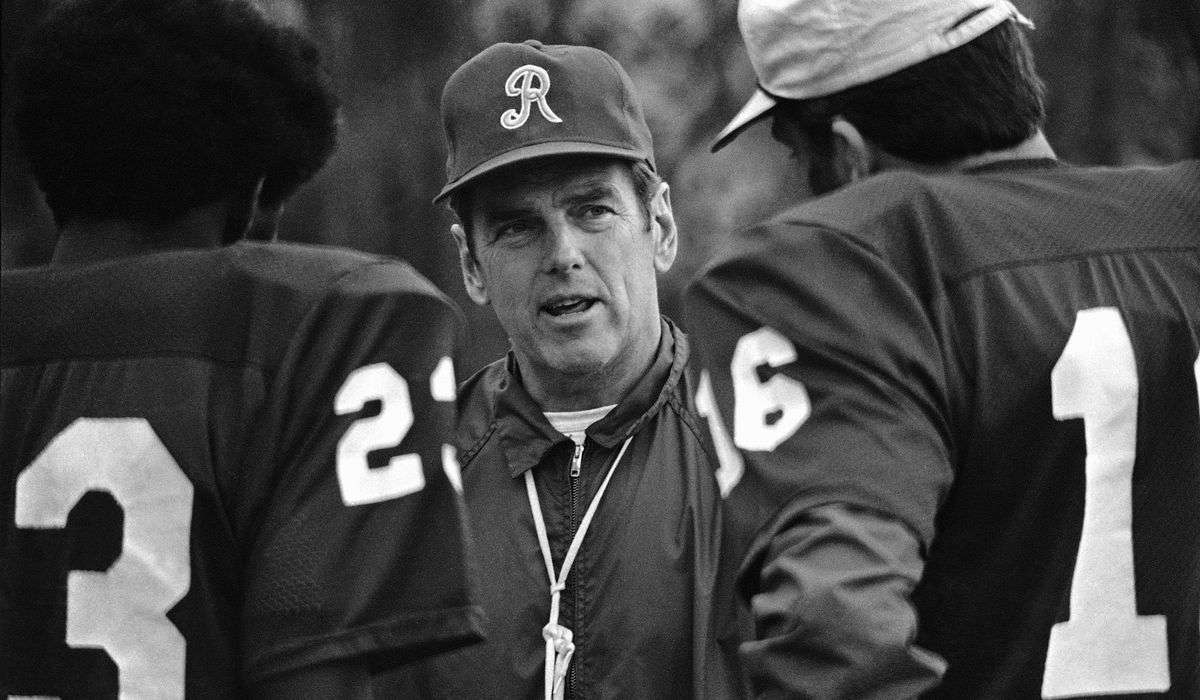LOVERRO: Relive the good times of Washington Redskins football with ‘George Allen’ book

In these dismal final days of the Washington Commanders’ season, fans may find themselves in a typical state of mind — seeking solace in the rich history of this franchise.
That history is more distant than ever, and maybe new owner Josh Harris writes a new entry that is worthy of your attention and devotion in the future. But right now, memories and tradition, as usual, are pretty much all you’ve got.
There’s a new place to find those memories, to relive the good times and learn some fascinating behind-the-scene stories — a new book about the man who helped lead the Washington franchise from years of failure to an era of success.
“George Allen — a football life (University of Nebraska Press),” by author and historian Mike Richman captures the life and accomplishments of one of the most successful NFL coaches of all time who brought a new joy to Washington when he took over as head coach in 1971. For Richman, who also wrote several other books about the football team, including “Joe Gibbs: An Enduring Legacy,” writing about George Allen was a labor of love.
“I grew up in Montgomery County and became a true Redskins fan when Allen became the team’s coach in 1971,” Richman said. “I became emotionally attached to those George Allen-coached Redskins and attended the two biggest postseason wins of his NFL career over the Packers and Cowboys in December 1972. So having the opportunity to write about this coaching legend was very, very special to me.”
It was special to the Allen family, too, because they cooperated with the book. “My story about George Allen’s life and coaching career would not have been as compelling without the help of the Allen family,” Richman said.
”Allen’s oldest son George Felix Allen (former governor and U.S senator from Virginia), was my key contact. We spent hours on the phone, and he shared old videotapes and other materials. I also had several long phone conversations with Bruce Allen and Jennifer Allen. I briefly interviewed his wife, Etty Allen, and another Allen son, Greg Allen, when I first started working on the book. She passed away shortly thereafter. Plus, the Allen family allowed me to access all of their father’s archival material that they donated to the Pro Football Hall of Fame. The material included old newspaper and magazine articles, letters and memos, event programs and his original contracts with the Chicago Bears and Los Angeles Rams. Having access to those items proved invaluable in my research and completion of the book.”
George Allen, who passed away in 1990, had a Hall of Fame career — he was inducted in Canton in 2002 — that including eight years as an assistant coach with the Chicago Bears and as head coach with the Los Angeles Rams from 1966 to 1970. He led the Rams to a 49-17-4 record. But it was his time in Washington, leading the Redskins to the Super Bowl and posting a 67-30-1 record from 1971-1977, putting together a veteran team known as the “Over the Hill” gang, where Allen had his most noteworthy accomplishments.
Richman’s book reveals how volatile the relationship was between Allen and team owner and president Edward Bennett Williams. Part of the legend of the Allen tenure was the story of when Williams joked, “I gave him an unlimited budget and he exceeded it” early in their relationship:
“Allen seethed when Williams mocked the coach’s spending decisions, especially the financing of Redskins Park and the signing of veterans to pricey contracts, with his joke at the 1971 Welcome Home Luncheon that Allen had “exceeded” his unlimited budget.
“Sam Huff was at that luncheon. He remembered Allen’s reaction to Williams’ comment: ‘Allen got right up to the microphone and lashed at him. He said, “You want to win or not? You brought me here to win. This is what it takes. Don’t be counting the money.’
“When Williams made that comment, assistant coach Ted Marchibroda sensed a spike on the Williams-Allen tension meter. ‘I can’t say where the breaking point was between the two. But he just didn’t like that statement. I know that.’”
They also clashed about Allen’s decision to go with Billy Kilmer as the starting quarterback for much of his time in Washington:
“Allen respected the fact that Williams was a master of the law and brilliant at his craft, but he disliked Williams mismanaging his decisions about who to start at quarterback and threatening not to renew Allen’s contract if he didn’t comply. Williams, whose nickname was ‘Panic Button,’ would call the coach’s house late at night and tell him to start Sonny Jurgensen over Kilmer and Joe Theismann over Kilmer in later years. In the case of Jurgensen, Williams thought the team’s lucrative investment in the prolific passer should be put to good use. He’d ask Allen, ‘George, we’ve got a half million-dollar air force. When are you going to use it?’
“Bruce Allen also knew about those late-night phone calls from Williams to the family’s home in Great Falls, Virginia. … Bruce emphasized that his father never buckled to Williams’ demands about who to play: ‘He enjoyed doing what he wanted. He would have preferred that Williams would have agreed with what he was going to do. But he was pretty stubborn that way. He was going to do what he thought was the right thing. It really didn’t matter if he said it or a newspaper said it or whoever said it.’”
There is so much more about Allen’s football life in the book and would be an important addition to any Washington football fan’s library, the place where Sundays are pleasant, not painful.
⦁ You can hear Thom Loverro on The Kevin Sheehan Show podcast.






